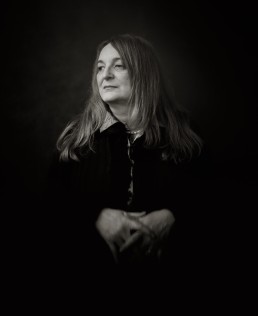S1: Episode 42 - Sylvia Stinson-Perez

Episode Information
[Intro Music]
Narrator: Welcome to My Heart is Not Blind. Narrative histories about blindness and perception. A traveling exhibition and book published by Trinity University Press, supported by Kronkosky Charitable Foundation, edited and hosted by Michael Nye. Stories are often found, resting along the edges of surprise and revelation. Every person, every place is a map to somewhere else. Episode 42, Sylvia Perez.
Sylvia: I am blind, but I am also very visual. I have images in my mind that are saved from what I could see, and I create images by the information that I gather. Even when I travel or I go to the beach, I create an image of what a wave looks like coming in because I remember what it looks like. So based on the sound of it, I create that image. I don’t think of myself as a blind woman. I am a woman who is a mother, who is a wife, who is a leader of an organization, who’s a daughter, a sister, a friend. I’m all of those things. Blindness just happens to be one of those characteristics. I would not be telling the truth if I did not say that it’s a huge part of who I am. However, I don’t really feel like it identifies me.
When I was growing up, my classmates ostracized me. They treated me as if I was almost contagious, and I remember feeling, and I’m gonna use this word, and it’s the word I mean to use like an alien on this planet. You’re blind, you can’t do anything. You’re stupid, you’re retarded. No one likes you, you’re ugly. And that was all the way from the day I started school. Through the day I graduated from high school. I have had to adapt to going from really being a visually impaired person, to being a person with really no functional, usable vision. I remember when I was probably in my late, late twenties, and it was about time I probably needed to use a cane and orientation and mobility instructor said to me one day, look, you have the choice. You can either look blind and carry a cane, or you can look drunk and not carry one. It probably took me a good 10 years to become really comfortable using that cane. Adjusting to blindness emotionally is way more challenging than adjusting to blindness physically.
There is this perception that people who are blind, that there’s something wrong with us. We are not whole beings that we’re imperfect. Every single person is imperfect. We all have challenges. Mine just happens to be that I can’t see. It doesn’t make me less intelligent, less capable, less competent. What it does is make me more courageous, more determined, and more interdependent. It takes a lot of energy to be blind. Every single day you’re gonna encounter something, some challenge that you are going to have to figure out. It’s a lot of learning to think differently, and it means being aware of all of your environment, what’s under your feet when you’re walking along a sidewalk where people are when you can’t see them. You can feel when there’s a presence next to you, walls and poles, the space around you changes a little bit.
There is a lot that people who are sighted could learn about fully experiencing the world around them from people who are blind. Being aware that there’s more than one way to get information. You can even gather information about people’s attitudes just by listening, and you can hear it in how their breathing is even silences and pauses, and who often information is based on completely what people see and they’re not paying attention to all of those other things that are happening. I can tell when someone’s rolling their eyes or looking another direction or texting, even though I can’t see that. I can tell completely by listening.
[Outro Music]
Host: I met Sylvia Stinson-Perez when she was the executive director of the Port Richey, Florida Lighthouse for the Blind. She immediately invited me and my assistant, Alexei Wood to dinner at her home with her husband Roger, and her daughter Olivia. I must say Sylvia is remarkable not only for her deep commitment to advocacy, but for her enthusiasm. It’s contagious. She has a master’s degree in social work, visual disabilities, and Business Administration. She has served as the director of T A C, Technical Assistant Center at the Mississippi State University. She’s one of the founders of a wonderful podcast, Bold Blind Beauty on AIR, Access, Inclusion and Representation. Currently, Sylvia works for the A F B, the American Foundation for the Blind, to oversee their many programs, including the leadership conference. Thank you, Sylvia, for your wise energy, your kindness, and for all you do for others. Join us next week. I’m Michael Nye. Thank you so much for listening.
